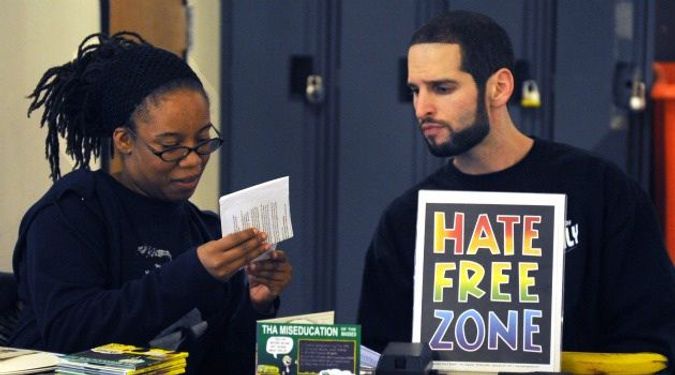‘Israel Apartheid’ Week Comes to Brandeis

Graphic by Angelie Zaslavsky

One-State Speech: Last month, Boycott Israel protesters held a conference at the University of Pennsylvania. On Wednesday, ?Israel Apartheid Week? came to Brandeis for the first time. Image by peter tobia
The protest movement known as Israeli Apartheid Week is well underway at campuses across the U.S. And this year, there’s a new college on the roster: Brandeis University.
Heated discussion over Israel is not new to the predominantly Jewish school, but this is the first time that the campus’s Students for Justice in Palestine chapter has organized a series with the controversial moniker.
“In the past, we were worried about using the word ‘apartheid,’” said Noam Lekach, a Brandeis sophomore who helped plan the event. “We decided we wanted to tell the truth.”
Ali Abunimah, a rising pro-Palestinian speaker and activist, delivered the keynote speech at Israeli Apartheid Week, speaking Wednesday night to about 80 students and faculty members in a room on the Brandeis campus that was two-thirds full.
Abunimah is a proponent of the one-state solution to the Israeli-Palestinian conflict, which calls for Jews and Palestinians to live with equal rights in a single, secular state encompassing the borders of present-day Israel and the occupied territories.
He called the two-state solution, calling for independent Israeli and Palestinian states side by side, a “political science fiction” that is proving increasingly unworkable by the day.
“The reality of a single state is one that is inexorably going to dawn on more and more people,” said Abunimah. “The only questions will be how to resolve it. Will it end in catastrophe? Or will we move toward a democratic outcome in which the status of Israeli Jews is changed from that of settlers to citizens and Palestinians from native colonized people to equal citizens as well?”
The one-state solution, which Israel advocates say will spell the end of the Jewish state, will also be discussed at the Harvard Kennedy School this weekend at a conference featuring Palestinian academics and activists. The “One State Conference” has raised the hackles of mainstream Jewish groups, with the Anti-Defamation League’s Abraham Foxman writing in a letter to Harvard President Drew Gilpin Faust: “This conference links Harvard and the Kennedy School with a discredited concept having a singular outcome: the elimination of Israel as the national homeland of the Jewish people.”
At Brandeis, the Abunimah speech went off without controversy. Like their pro-Israel counterparts at the University of Pennsylvania during last month’s Boycott, Divestment, and Sanctions conference, Brandeis’s Zionist groups opted not to protest the Israeli Apartheid Week events.
Instead, they hosted their own Israel advocacy events. At 6:30 on Wednesday evening, a corner of Brandeis’s dining hall had been turned into a pro-Israel party, with Israeli flags, food, and music. The point was to “give a human side of Israel,” said Avi Fuld, the sophomore vice president of Brandeis Zionist Alliance.
Fuld said that at last year’s Israeli Occupation Week, his group lost their cool, staging a walkout at the widely attended Noam Chomsky event. “We were reactive and responsive,” he said. “It looked like we weren’t open to dialogue.”
A few members of the Brandeis Zionist Alliance appeared at Abunimah’s speech. They sat in the back row, shaking their heads when they disagreed with a point. Aside from a few terse words regarding the events surrounding Israel’s founding in 1948, the conversation was a picture of civility.
In his speech, Abunimah praised Brandeis for having him speak.
“I think it is important that these questions are being asked at Brandeis, of all college campuses,” he said. “I think that college students and universities in general ought to be and at best are the consciences of our societies.”
Contact Naomi Zeveloff at [email protected] or on Twitter @naomizeveloff
















